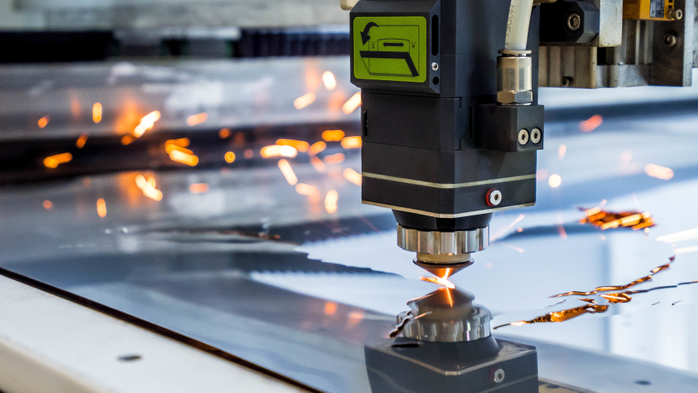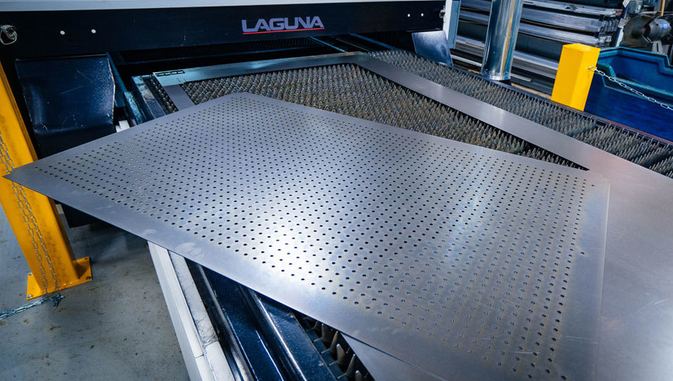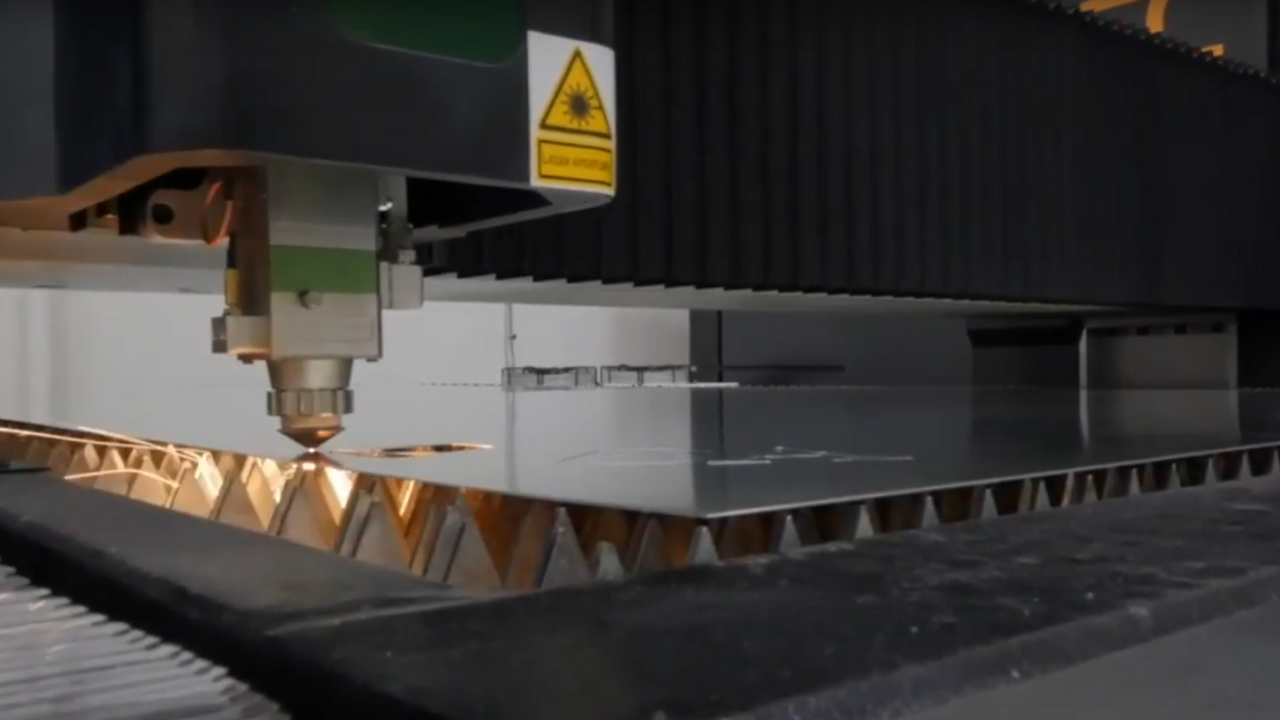Metal Fabrication Definition: What Is It?
Metal fabrication is a common manufacturing process used across a wide range of industries. It is simply the process of putting sheet metal through a series of machining processes to create an end product. Metal fabrication is used to create parts for vehicles, homes, tools, and equipment.
CNC machines are especially useful in metal fabrication shops because they can perform complex and intricate cuts that would be difficult, or in some cases, impossible, to achieve with traditional, manual methods. Additionally, CNC machines can produce parts at a faster rate and with greater accuracy than manual methods, resulting in greater efficiency and cost savings.
Overall, CNC technology is an essential tool for modern metal fabrication, allowing for faster, more exact, and more consistent production of high-quality metal goods in machine shops.
Benefits of Fiber Lasers for Metal Fabrication
For metalworking projects, you want tools that enable greater productivity and manufacture customized parts quicker without sacrificing quality. Fiber lasers from Laguna Tools help you accomplish just that. The following are some great advantages of these CNC machines for metal fabrication and production:
- Flexible: Fiber lasers can cut through aluminum, brass, steel, and stainless steel without causing back reflections that might damage machinery.
- Cost-effective: Fiber lasers allow you to significantly reduce spending on maintenance and operation.
- Adaptable: Laguna Tools delivers fiber lasers with multiple power options, including 1000W, 1500W, 2000W, 2500W, and 3000W, to meet various needs.
- Fast: Offering a maximum cutting speed of 35 m/min, these fiber laser machines cut through pieces of metal quickly and accurately.
- Safe: Options are available with enclosed working areas to reduce light pollution.
 CNC Machines Have Transformed The Metal Industry
CNC Machines Have Transformed The Metal Industry
 Why Sign Makers Are Upgrading to CNC Machines
Why Sign Makers Are Upgrading to CNC Machines

Other Types of Metalworking CNCs We Offer
Plasma cutting, burning, forming, machining, riveting, shaping, tooling, TIG welding, and the various aspects of sheet metal fabrication — there are many types of metal fabrication processes utilized in different industries. In addition to fiber lasers, Laguna Tools provides other styles of metalworking CNCs to help you with these many tasks and more. Varieties include:
Plasma Cutters
CNC plasma cutters deliver industry-leading performance at a price that suits your budget. Achieve outstanding accuracy and edge finishes with these plasmas. Features include:
- All-welded steel frame for lasting use, precision, and added power abilities
- Helical rack and pinion drive system for the X and Y axes
- Precision ground ball screw for Z-axis stroke
- Automatic height control to ensure the proper torch gap height no matter where you operate on the panel
- Industrial PLC programming for superior reliability
- Run on standard G-code for greater compatibility with virtually any software
- Wireless control system connection for setting up anywhere in your shop
- Plate sensing helps the torch locate the surface to increase curve width consistency and decrease necessary consumables
Fiber Markers
For an innovative solution, try the new generation of laser marking systems from Laguna Tools. These fiber markers feature the most updated laser technology and can permanently mark and engrave metal and industrial polymers. Our selection showcases machines with different functions to help you complete different metalworking jobs.
CNC Router Machines
As with fiber lasers, CNC router machines can increase efficiency and potentially lower some operating and production costs. They also boost accuracy and make it easier to produce customized metal products. What’s more, you can use CNC router machines with more than just metal — they are a go-to for businesses that manufacture parts using various types of wood, as well.
Explore Metalworking CNC Machines
See our collection of CNC machines and routers for metalworking projects. Increase your production efficiency drastically speed up you metal manufacturing process.
Different Types of Metals Need Different Metal Fabrication Techniques
There are two broad categories of metal material: hard and soft.
Soft Metals
Soft metals are malleable and more ductile than hard metals. They include:
- Aluminum
- Brass
- Copper
- Magnesium
Soft metals usually don’t need as much heat treatment to be manipulated.
Hard Metals
Hard metals are stronger and more elastic. They include:
- Chrome
- Stainless steel
- Titanium
- Tungsten
Both soft and hard metals can be alloyed to create a workpiece with certain desired characteristics. For example, magnesium can be combined with zinc and aluminum to create an alloy often used in vehicle construction.
Hardness or softness can affect CNC machining processes – a soft metal can’t withstand as much force as a hard one. A technician will need to program their CNC machine appropriately to keep a soft metal from smearing. Conversely, harder metals may require stronger cutting tools, like carbides or diamond-infused cutters.
Metal Fabrication Has Wide Applications in Different Industries
Think about how many items we use each day have metal parts: from the cars we drive to the appliances we use at home.
Since many industries require custom metal fabrication to create parts for tools and equipment, the use of CNCs is ubiquitous in day-to-day metal manufacturing tasks.
Consider the following industries that rely on CNC machines for metal fabrication projects:
- Aerospace: Steel and aluminum are often used to create lightweight, aerodynamic parts for airplanes.
- Automotive and transportation: Sheet metal is thin but strong, making it an ideal material for vehicle panels, hoods, and fenders. Additionally, the railroad industry needs carefully designed metal parts like bolts and fasteners to safely transport goods.
- Medical: Stainless steel is a common material for medical devices and equipment. More and more, surgeons are using assistive robotic devices, which require precisely constructed metal parts.
- Energy: As interest in alternative energy sources grows worldwide, finished metal pieces are needed for large-scale equipment like wind turbines and solar panels.
What the Future Looks Like
As we look toward the future of metal fabrication, we can expect even more advancement in CAD technology, as well as newer tools like 3D printing. And the industry is growing rapidly: by 2029, the global metal fabrication market is expected to be worth over $29 billion.
From welders to blacksmiths, any professional that practices metalworking can benefit from CNC machining and similar industry technology to enhance metal fabrication processes. Contact the experts at Laguna Tools today.
